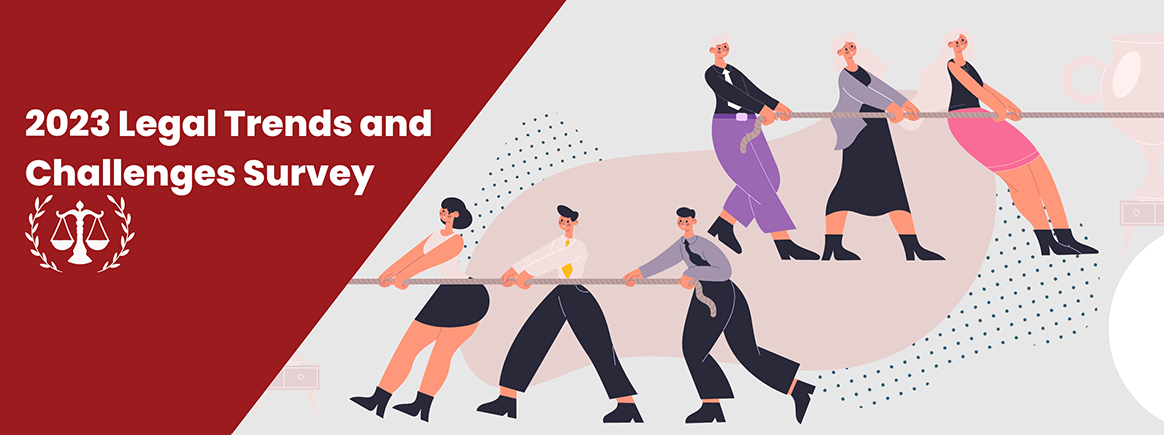
Upcoming Competition to the Traditional Lawyer Business Model
We always overestimate the change that will occur in the next two years and underestimate the change that will occur in the next ten. Do not let yourself be lulled into inaction. — Bill Gates
Introduction
In our recent 2023 Legal Survey, the data unexpectedly told us that a significant number of law firm respondents displayed an absence of concern regarding the increasing types of competition within the industry. Particularly, firms appeared least concerned by three factors: the evolving priorities among younger professionals, the competition from alternative legal service providers, and the growing competition from legal tech. Ignoring these shifts in the legal landscape could prove extremely harmful to law firms and their businesses. Take the pandemic, for example, which was the most notable shift in recent years. Firms that decided to invest in software and technology that allowed staff to work at home thrived. Those that did not invest in, for instance, work-from-home (WFH) technologies most likely found themselves at a complete competitive disadvantage. The expectation is that this will also be true with the shifting of priorities and expectations of the next generation. Without acknowledging the wants and needs of these professionals, firms will struggle to retain present talent and also attract new talent.
In this new legal landscape, firm owners are encountering a fresh set of challenges that demand their attention. These factors are reshaping the traditional approach to legal practice and necessitate a closer look at how legal professionals adapt. In this blog, we explore why these trends warrant genuine concern from lawyers and how they collectively shape the path forward in the legal field.
Changing Priorities & Expectations Among Younger Professionals
One of many priorities at the forefront of young professionals' minds is the importance of work-life balance. Even as the pandemic that accelerated this concern could be classified as “over,” many younger professionals are still fighting for flexibility. Hesitation when it comes to listening to your younger employees could cause them to seek employment elsewhere. Surprisingly, our findings revealed that 43.32% of law offices are unconcerned by the shifting priorities and expectations among younger professionals. While only 15.6% were very concerned. This statistic is astonishing, as young lawyers are essential to any firm's future success. As GenZ professionals make their entry into the workforce, the legal industry finds itself at a crossroads of generational transformation. These emerging professionals bring to the table unique viewpoints, values, and work habits. It is crucial to listen as a firm's more senior legal professionals retire and leave the industry if that firm wishes to attract and retain top talent.
In order to retain and attract the best and the brightest, law firms must accommodate these evolving priorities and expectations of young professionals. How can a law firm sustain its business if, every year, young lawyers leave because they feel overworked? Or underpaid? The responsibility of cultivating the next generation of legal professionals falls onto the older generations, and their ability to be flexible and accommodating is critical. In practice, this could mean implementing more adaptable work arrangements, fostering mentorship opportunities, and carving out career pathways that align with the new generation's aspirations. Creating a work environment that aligns with the goals and expectations of these younger professionals will be essential to sustain a legal practice.
Competition from Alternative Legal Service Providers / Outsourcing
Once at the periphery of the industry, Alternative Service Providers (ALSP) and the benefit of outsourcing legal work is beginning to create a formidable impact on the core fabric of legal practices. Interestingly, the statistics captured from our survey tell a tale of varying apprehensions. While some law offices hold a cautious stance, with 33.68% acknowledging a degree of worry, a 15.97% voiced profound concern, underlining the novelty of this threat to a firm's traditional business model.
The rise of alternative legal services providers and the trend of outsourcing legal tasks are not mere coincidences. They reflect changing client expectations, the need for flexibility and the pursuit of cost-effective solutions. In the past, clients were content with the traditional landscape (or had no alternatives). However, the legal profession has evolved from the traditional hourly billing model. Clients no longer require every step to be handled by a single lawyer or one single team. Instead, they can outsource work to overseas legal professionals, notaries, or even AI, saving costs. Most ALSPs boast streamlined operations, enhanced with technology, leading to improved efficiency. This efficiency translates into more cost-effective services for potential clients. While the demand for legal services is increasing, clients are becoming more price-conscious, a demand many ALSPs are ready to fulfil.
With globalisation, the ability to go anywhere in the world for legal advice puts a large pressure on pricing models. As competition increases on a global scale, we may see a further downward pressure on legal fees. Firms now face the dilemma of offering the most competitive pricing to attract clients while needing revenue to sustain and grow their business. This trade-off is prompting some law firms to venture beyond their comfort zones, seeking partnerships, promising efficiency, cost savings and adaptability. Law firms are now considering pricing strategies to compete for clients on both quality and cost. This may lead to established firms adjusting their prices in order to ensure client loyalty and fight attrition.
With potential clients being able to choose from a number of options, clients may jump from one firm to the next to look for the best deals. Offering competitive pricing may initially attract clients, but subsequent price increases could prompt them to seek better offers. Maintaining clients over the long-term is expected to be more difficult and, without a consistent client base, a firm's viability is at risk.
Competition from Legal Tech
Every year, the legal landscape undergoes changes driven by the emergence of new technologies. The shift to remote work prompted law firms to adopt technologies enabling them to access and work on client matters online. While these advancements bring numerous opportunities, they also give rise to a range of future challenges that all legal professionals must confront such as automation and artificial intelligence (AI).
A staggering 58.68% of law offices expressed little to no concern, while 25.69% admit some level of concern. The remaining, yet still significant, 15.63% voiced deep-seated unease ” a testament to the potential impact legal tech is beginning to exert on the traditional framework.
There has been a significant rise in automation in the legal industry. Let's say first — automation is not bad. All law offices utilize some kind of automation in their legal techstack. Whether your software assists in time billing, centralizing legal matters and client client cases, or managing deadlines, a robust techstack contributes to maintaining organization and efficiency within your firm. However, as AI and automation technologies rapidly advance, a growing concern among legal professionals is the potential displacement these technologies might cause. Tasks such as legal research, document drafting, review and contract analysis, traditionally the purview of highly-trained professionals, can now increasingly be done by computer programs and online services. AI has the potential to make these services accessible not only to lawyers and legal professionals, but also to prospective clients.
Take drafting a will as an example. Several programs currently leverage AI to generate wills at a much lower cost than hiring a human lawyer. Besides being more budget-friendly, AI also operates faster and with significantly fewer errors than its human counterparts. The concept of AI competition isn't just causing legal professionals to worry about job loss; it is also creating an environment where clients expect lawyers to offer services at lower rates, despite these lawyers or legal professionals possessing substantial experience. Looking ahead, the challenge will be finding that balance between embracing automation to enhance efficiency and preserving the value of human expertise that will become a crucial challenge.
Conclusion
The way legal work is done is changing. New technologies, such as AI, and new ideas, such as outsourcing, are offering potentially faster and more efficient ways to complete everything from basic administrative tasks to complex legal drafting. At the same time, the newest generation of
lawyers and legal professionals have different expectations about when, how, and where their work will be done, and how they will be compensated. Finally, old and new clients are looking to reduce legal costs, and understand that they can seek advice and legal work in more places and with different fee structures.
The legal industry's response to these challenges will define its trajectory. By acknowledging and embracing these changes, law firms can carve a sustainable path forward. As the legal arena continues to transform, those who seize the opportunities presented by these shifts stand poised to not only thrive but also shape a more agile, client-centric, and efficient legal landscape.
You may also like
Happy Holidays Message from David Swadden, CEO
December 18, 2025
We would like to wish all our clients and readers a wonderful holiday season filled with joy and laughter.
Tracument Holiday Schedule
December 11, 2025
We would like to update all our clients of our Holiday Schedule this holiday season!
Tracument Wrapped!
December 4, 2025
What 2025 Looked like for Tracument and for you!




